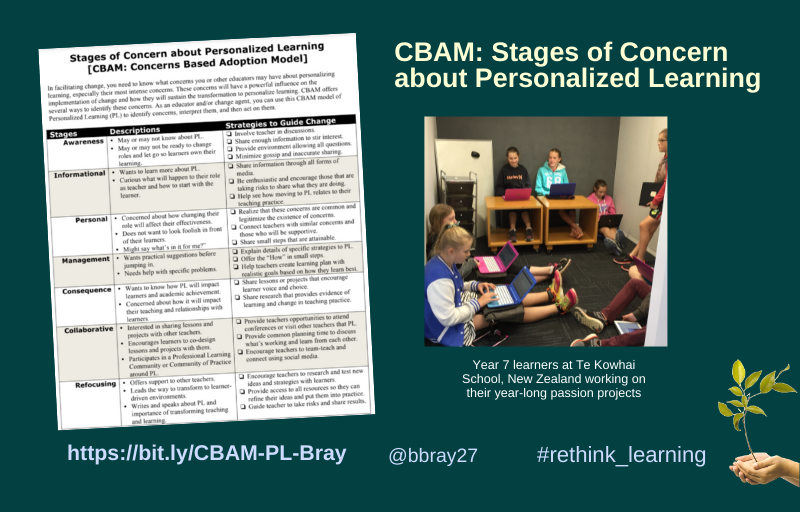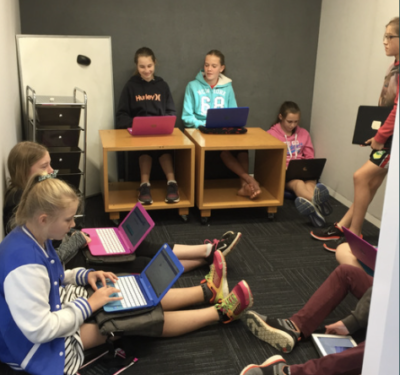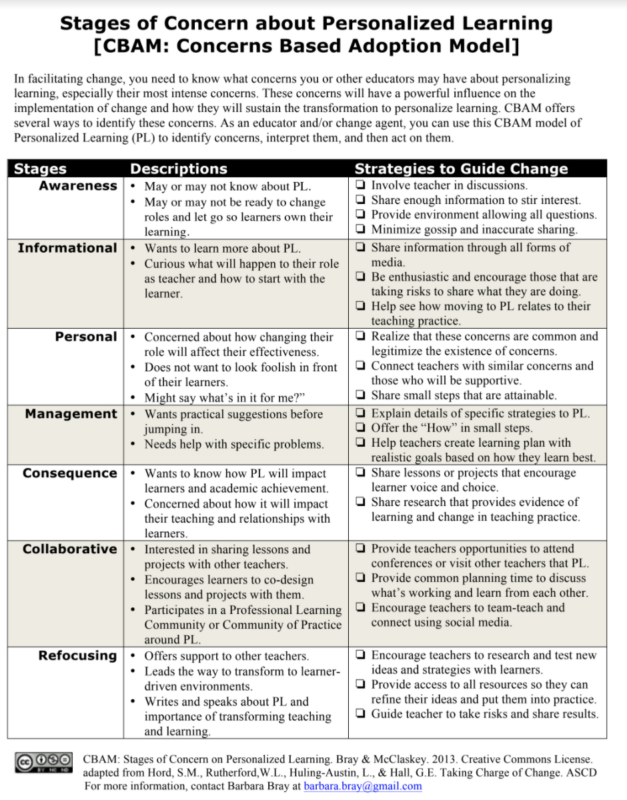
Are you a coach or administrator supporting educators as they attempt to create learner-centered environments? Change is complex. Changing or transforming any system especially in education is not an easy thing to do. If you are part of a system that most of us grew up in and are used to, it doesn’t take much to keep your school or district from moving to any new system or changing much at all. The change process is so complex that even if you agree and are working on transforming the system, there may be one piece of the puzzle that is missing that keeps change from happening. Check out this post “Why is Change so Complex?”
In facilitating change, you need to know what concerns you or other educators may have about personalizing learning, especially their most intense concerns. These concerns will have a powerful influence on the implementation of change and how they will sustain the transformation to personalized learning. The Stages of Concern-Based Adoption Model (CBAM) offers several ways to identify these concerns. As a coach, educator, and/or change agent, you can use this CBAM model about Personalized Learning (PL) to identify concerns, interpret them, and then act on them. Click on the image to get to a clearer PDF version.
We can be in any of the Stages of Concern depending on the environment, the situation, or our experience with personalized learning. We can actually be in several of the stages and not even be aware of it.
I’ve been coaching educators for over thirty years and many have demonstrated how they can take an existing lesson and look at areas where they can bring in voice, choice, and autonomy so students start developing learner agency.
However, I still get questions and see requests on social media or in emails for ideas, tools, resources, and other strategies to support teachers and systems. Personalizing learning is more than just changing one lesson but sometimes starting small opens doors to magical learning. I believe people are aware of personalized learning but now are more concerned about “learning loss” during the pandemic. I have my own concerns about putting the focus on content before building relationships and developing a compassionate and caring culture.
 I visited and worked in New Zealand in 2017 with Dr. Cynthia Sistek-Chandler. Our hosts, Leigh Hynes and her team and Anne Kennelly from Core Ed spoiled us by facilitating amazing visits at schools in the north and south islands. What we saw gave us hope. The Year 1 to Year 8 schools were designed to personalize learning. We visited Te Kowhai School and talked with Year 7 learners working on their year-long passion projects. I sat with them to find out all about their projects and didn’t want to leave. Each of the learners found mentors outside of school. One wanted to learn how to quilt so asked her grandmother to be her mentor. Another wanted to learn Greek and about the culture so asked his uncle to be his mentor.
I visited and worked in New Zealand in 2017 with Dr. Cynthia Sistek-Chandler. Our hosts, Leigh Hynes and her team and Anne Kennelly from Core Ed spoiled us by facilitating amazing visits at schools in the north and south islands. What we saw gave us hope. The Year 1 to Year 8 schools were designed to personalize learning. We visited Te Kowhai School and talked with Year 7 learners working on their year-long passion projects. I sat with them to find out all about their projects and didn’t want to leave. Each of the learners found mentors outside of school. One wanted to learn how to quilt so asked her grandmother to be her mentor. Another wanted to learn Greek and about the culture so asked his uncle to be his mentor.
When I talked to the learners, they were so engrossed in working on their projects. That to me was “personalized learning.” They owned the process, who would support them during the process, and what they wanted to learn about.
I understand that it is not that easy for every teacher or school to be ready to let learners take ownership of the learning.
When I worked with coaches, I used CBAM to determine where the teachers were in the Stages of Concern. The questions helped us determine the strategies to support them. Just like you do with your students to meet them where they are, you can use CBAM to determine where you can meet teachers to personalize their own professional learning.
You can use CBAM to determine where you are in the process. Some teachers have told me they find themselves in two of the Stages: Personal and Management. If that is the case, then you can combine the strategies to develop activities that support them as they create learner-centered environments.
Try CBAM. See how it works for you. You can reach out to me and leave a comment below.
*****
Interested in checking out more of the Rethinking Learning podcasts, click on the podcast tab at the top, the logo below, or go to https://barbarabray.net/podcasts/
For more information about Barbara’s book, Define Your WHY, go to this page or click on the image of the book for resources, questions, and links.





